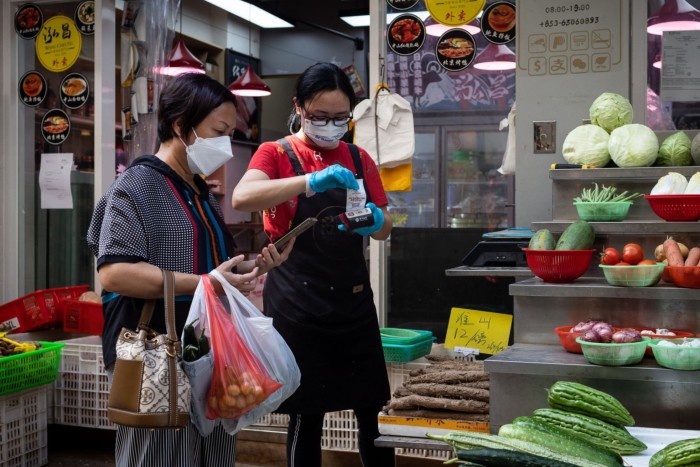Beijing’s hopes for an economic revival after recording slowing growth last year will depend in large part on the animal spirits of small and medium-sized enterprises, which account for the majority of output, urban employment and tax revenues but were hit hard by the pandemic.
While China’s best-known private-sector companies are tech giants such as Alibaba and Tencent, SMEs — officially defined as companies with 1,000 or fewer employees — account for about 80 per cent of total employment and 70 per cent of corporate revenue, making them a crucial driver of any economic recovery.
China’s National Bureau of Statistics announced on Tuesday that the economy expanded by just 3 per cent last year, far below the government’s target of 5.5 per cent and the second-weakest growth figure since 1976.
“The government’s challenge now is to rebuild private-sector confidence, which will be essential to boost household consumption and private investment,” said Eswar Prasad, a China finance expert at Cornell University.
SME owners, however, say their operations continue to be hamstrung by government-mandated costs, including recent double-digit increases in social security payments, which could derail policymakers’ hopes of a rapid economic recovery this year.
“The official message is that they are propping up SMEs,” said Shaun Rein, a longtime China market analyst and founder of a research firm in Shanghai. “But as a business owner, I don’t see enough of it.”
Senior figures have made repeated assurances in recent weeks that President Xi Jinping’s administration is determined to support the private sector.
Liu He, China’s top economic official, said at the World Economic Forum in Davos on Tuesday said that “entrepreneurs will play an important role as the engine driving China’s historical pursuit of common prosperity”, a policy priority of Xi’s. “If wealth doesn’t grow, common prosperity will become a river without source or a tree without roots,” Liu said.
But since late last year, more than a dozen cities and provinces have increased minimum employer-funded social security payments, which for small businesses are often a fixed sum rather than a percentage of wages, by 10 per cent or more. Regional authorities argue that the rises were needed to keep pace with strong wage growth since 2021, when global demand for Chinese exports surged, helping insulate the world’s second-largest economy from the impact of the Covid-19 pandemic.
Small business owners counter that China’s economic environment has worsened dramatically since then, and the outlook remains uncertain as the country battles a Covid outbreak that has claimed at least 60,000 lives since pandemic controls were abandoned last month.
“I pay so much money for my employees’ pension and health insurance that I can barely break even, let alone grow my business,” said Li Anquan, owner of a market research firm in eastern Shandong province.
Business prospects have been further clouded by the sharp downturn in global demand for Chinese products, with exports falling about 10 per cent year on year in November and December.

The pressure has been particularly acute on small companies in the services sector, for which labour is often a leading expense, with social security expenditures typically accounting for as much as one-third of total operating costs.
On January 6, the Shandong provincial government said it would increase minimum social security payments by 10 per cent this year. Three days later, Jiangsu province, an industrial and export powerhouse that borders Shanghai, announced plans to raise payments 6 per cent this year after a 12 per cent bump in 2022.
David Li, the owner of a Beijing-based advertising company, said he had to scrap plans to hire two account executives after the municipal government raised social security payments by 15 per cent.
“I am not going to hire another person until the government makes social security more affordable,” Li said.
The steep increases in employer contributions are out of step with inflation, which has been more subdued in China than in Europe or the US over the past year. Chinese consumer prices rose just 0.9 per cent in 2021 and 2 per cent in 2022, far lower than double-digit average wage increases used to justify higher social security payments.
According to the Beijing municipal government, average wages in the capital increased 13 per cent in 2021 while the city’s CPI rose 1.1 per cent. For the same year, Hunan, a relatively poor province in southern China, reported average annual wage growth of 8 per cent.
SME managers said such increases did not reflect their experience weathering the pandemic, which forced many of them to reduce salaries and headcounts. The discrepancy may be due in part to the fact that official statistics reflect the state sector more than private-sector SMEs.
“Small businesses are under-represented in the official wage numbers even though mom-and-pop shops employ more than half of China’s workforce,” said a Beijing-based government policy adviser, who asked not to be identified. SMEs also account for more than 50 per cent of total output and tax revenues.
Two middle managers at state-owned enterprises in south-eastern Fujian province told the Financial Times they had recently received generous increases in their nominal salaries, but the adjustments simply made up for corresponding decreases in additional benefits that may not be captured by official wage surveys.
The social security tax rises may also reflect official unease about the outlook for the country’s pension funds. China’s population fell for the first time in 60 years in 2022, according to official figures released on Tuesday.
“The government needs to strike a difficult balance between reducing small businesses’ financial burden and keeping the social security system from going under,” said the government adviser. “For now, the top priority is to make sure retirees get paid on time.”
Additional reporting by Tom Mitchell in Singapore and Andy Lin in Taipei




Comments are closed, but trackbacks and pingbacks are open.